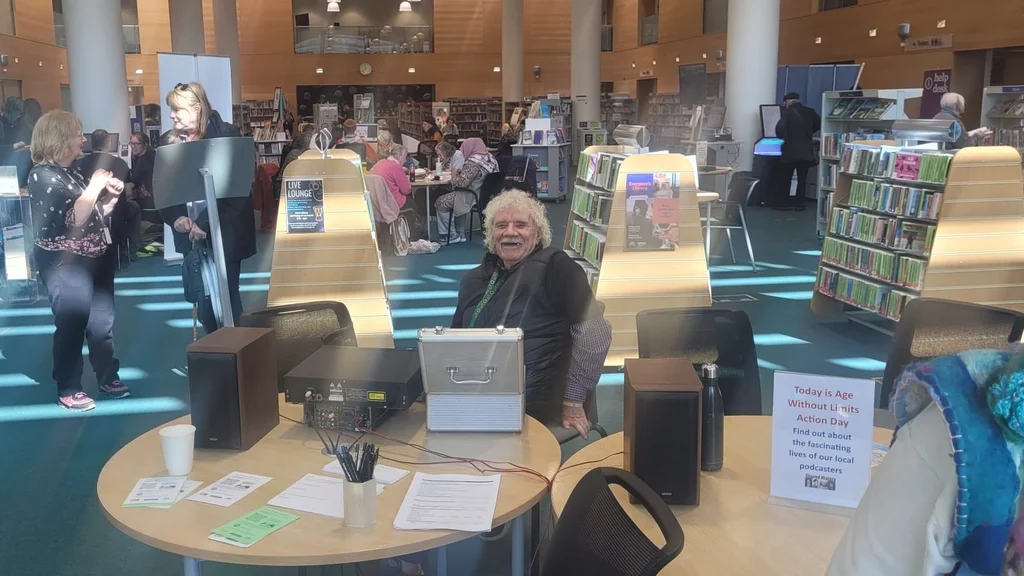Stories have incredible power in raising awareness of the impacts of ageism and changing the way people think about ageing.
We were excited to speak to Shared History to find out more about their stereotype-challenging podcast series, which they launched on the Age Without Limits Action Day with a day of intergenerational discussion.
The Action Day is a chance for individuals and communities, workplaces, friends and families to learn, take action and help change the way we think about ageing. In 2024 the theme was ‘See and Be Seen’.
Celebrating intergenerational conversations
Shared History is a storytelling project run by visual and performative artist Ruthie Glaser. To mark the Action Day, Shared History launched a three-part podcast series which platformed the stories of older members of the Brighton and Hove community, as told in their own words.
To celebrate the launch, members of the public were invited to join the stars of the podcast, Somerset Day Centre community members, and Brighton MET College Health and Social Care students at Brighton and Hove Jubilee Library for a day of poetry, quizzes and conversations, soundtracked live by 82-year-old DJ King Jerry (pictured at the top of this page). Shared History also worked with Brighton and Hove Seniors Housing to make the series happen.
Around 70 people attended throughout the day, and this intergenerational celebration was a very positive experience, Ruthie told us. She said that during the afternoon poetry and discussion session, “the different generations took time to listen to each other. A hugely positive element was in finding commonality and empathy for issues raised. For example, one older member talked about the feeling of being invisible. This idea was contrasted by the views of some of the younger women, who expressed their wish to hide so that unwanted attention could be avoided. Sharing positions on these important issues encouraged people at different places on the age spectrum to contribute their ideas.”
Ruthie added, “We sat in a circle in the library and wrote poetry with a broad audience of people who had differing cognition and a great respect for each other's contributions. Ellen, who is 96, shared some experiences of what it was like to wake up in Dresden on 13th and 14th February 1945 during extensive bombing and having to leave her house wearing her slippers. Telling this story to such a mixed audience was a very positive experience."
Ruthie also spoke of Kath, who featured on the podcast series and who attended the event via Zoom. Ruthie said, “Despite her not being physically present at the library, she was able to hold an audience and instigate an important political discussion over contemporary policing. When Kath was a young girl, some 90 years ago, she told us that she used to go and sit in the police box down at Brighton Marina for a chat. Some of the female students were very surprised at this. While this issue needs to be looked at through an appropriate lens, this example shows how representing the views of this particular elder brought incredible value and insight to an audience.”
The importance of older people’s representation
We asked Ruthie what ‘See and Be Seen’ means to her and the people she works with. She said, “When 82-year-old DJ King Jerry spun Motown and soul records that appealed to all ages, not only was he breaking the silence of the library, but he also shattered beliefs that people may have held about the upper age limit of a DJ. On a different level, ‘See and Be Seen’ is about being accepted as part of the community just because of who you are and not because of how old you are.”
The podcast series provided an opportunity to "give back control” to the people it featured, Ruthie explained: “by voicing their narratives the guests could rightfully re-claim life's stage as much as anyone else can. Each episode tells stories which challenge stereotypes; this is my individual story - I am not a number!”
Like everyone, older people have very different experiences and backgrounds yet are often labelled as one single group, separate from the rest of society. The intergenerational event challenged this assumption by providing space to celebrate people's individual voices and perspectives. As Ruthie said, “it was possible to see and hear how the appreciation of ageism as a concept grew and we actively tackled preconceived ideas through developing understanding, telling stories and using creativity and humour. One of the younger people at the discussion told us that there was an expectation for her to mix only with her own age group. She recognised how much she had benefited from meeting a broader group of people whom she now sees as being made up of individuals rather than parts of a whole.”
Ruthie added, “Underestimation affects us all at different times in our lives. When older people and any other members of society are underestimated, this can result in lost opportunities, benefits and equality of opportunity. Everybody deserves to be listened to and if this is not a given for all, then we lose out on the histories, memories and narratives which make sense of our world."
If you want to find out more about how you can take part in our next Age Without Limits Action Day (June 2025) don’t forget to sign up to our Age Without Limits newsletter or follow us on social media!
Back to Host an event.
